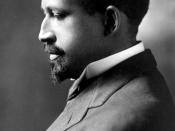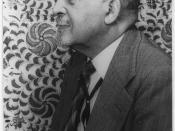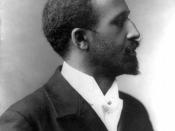Two great leaders of the black community in the late 19th and 20th century were W.E.B. Du Bois and Booker T. Washington. These men offer different strategies for dealing with the problems of poverty and discrimination facing Black Americans. Booker T. Washington?s gradualism stance gives him wide spread appeal among both blacks and whites, although W.E.B. Du Bois has the upper hand when it comes to his philosophy in dealing with economic prosperity and education among Blacks. These men had different views on segregation, education and the general role of African Americans in American society.
Booker T. Washington, educator, reformer and the most influential black leader of his time told of a philosophy of self-help. He urged blacks to accept discrimination for the time being and concentrate on elevating themselves through hard work and material prosperity. Washington believed that African-Americans would gain respect from the white community if they had trade skills.
He also believed that trade skills were key to economic security. This, he said, would win the respect of whites and lead to African Americans being fully accepted as citizens. In Washington?s ?Atlantic Compromise? in 1895, he promotes unity ?in all things essential to mutual progress.?
W.E.B. Du Bois, a black intellectual scholar and political thinker believed that academic education was more important than trade education. He thought Washington's emphasis on industrial education actually kept African-Americans trapped in lower social economic classes. Du Bois wanted African-Americans encouraged to succeed in the arts and sciences. In addition, he argued that social change could be accomplished by developing the small group of college-educated blacks. Du Bois urged blacks to attempt to uplift themselves through educational attainments and economic advancement. I concur with Du Bois and his philosophy that in order for blacks to arise, they must...


